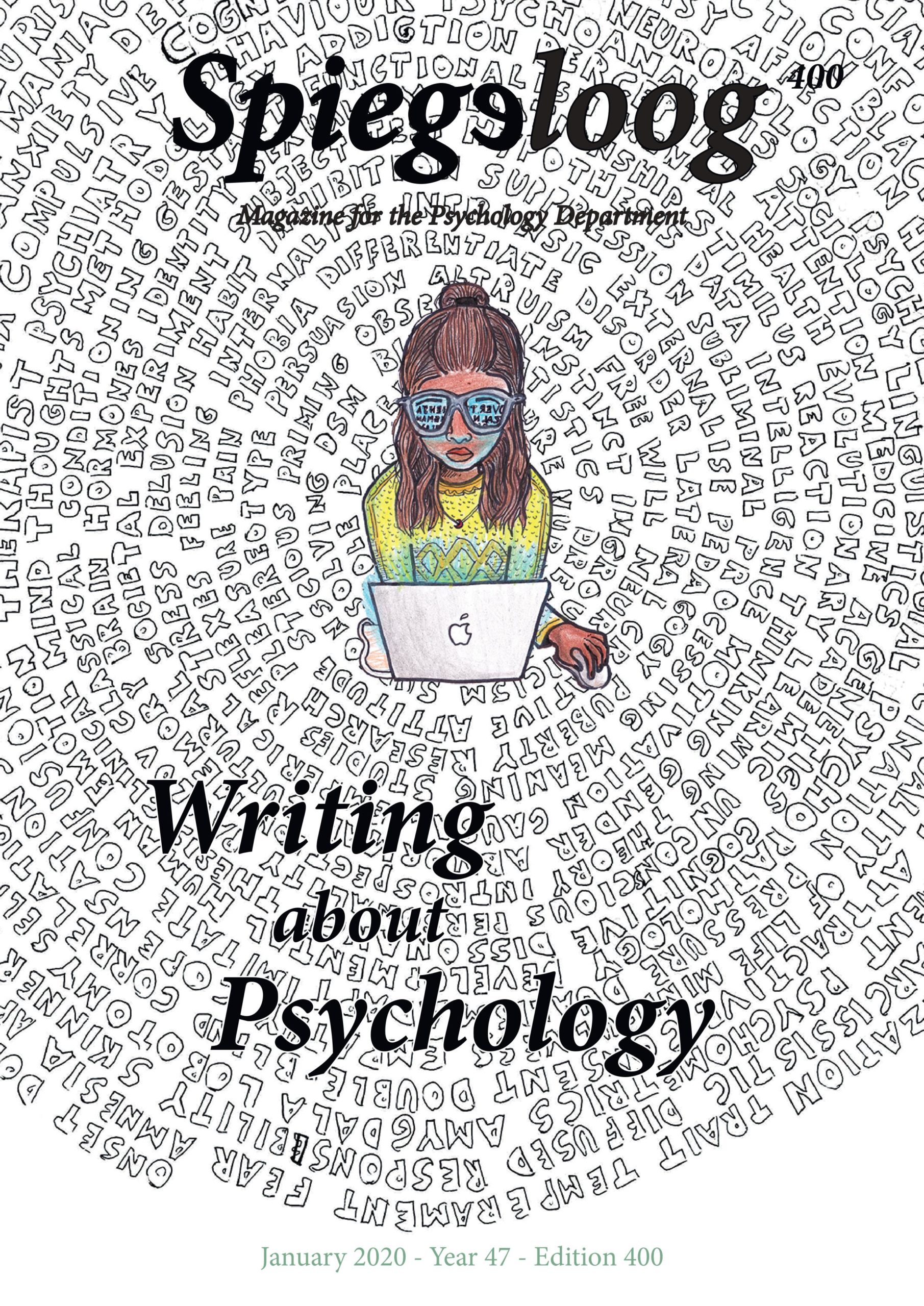

Whenever there was a fresh face present at one of Spiegeloog’s editorial board meetings, I became somewhat self-conscious. A self-consciousness that had everything to do with what I will call the drainage effect. This drainage effect applies to some of Spiegeloog’s editors, and works somewhat like this: when writing about psychology makes talented, soon to-be-psychologists critical or even cynical about the field and so, they decide to quit it. During their time at Spiegeloog, a lot of former editors decided that they wouldn’t pursue careers in the field of psychology, and their talent flows right out of the field. Instead, they entered the field of literature, journalism, copy-writing or philosophy, for instance. I won’t fall for getting causality and correlation all mixed up and say this is all the fault of the magazine we publish, but still I felt somewhat uneasy about potentially infecting young, ambitious and cheerful psychology students with the cynicism regarding certain aspects of traditional psychology that could be present during our meetings.
After contributing for three and a half years to 23 issues of Spiegeloog, of which seventeen as an editor in chief, I can now make up the balance, and see if the drainage effect applies to me as well. When rereading my articles of the last years, it becomes clear that I always write on typical psychological subjects like mental disorders, drugs and the mental health care system. At the same time, my arguments always have a clear societal dimension as well. I come across the phrase ‘maakbaarheid’ (‘malleable’ or ‘manufacturable’) a lot, which I typically seem to use as an adjective for the word ‘individual.’ This phrase translates to something like ‘the self-made individual.’
This phrase, ‘the self-made individual’, refers to the idea that human beings are totally manufacturable by themselves and their environment, and that they are the masters of their own faith. This is something we came to believe in more and more in recent decades. The influence of psychology and psychiatry as young, emerging disciplines must definitely have something to do with this. Bluntly stated, the influence of psychology on the idea of ‘the self-made individual’ could be something like this: gaining more and more knowledge on our feelings, thoughts and behaviours also gives us the idea that we can manage and control them better. The rapid expansion of psychiatric care in the West, combined with the general public’s increased awareness of diagnostic classifications, treatment options and the clinical language of psychiatry, made the idea that there is something we can do about counterproductive
thoughts, feelings and behaviours more accessible.
To understand what the influence of the psychological and psychiatric discourse on the individual is, it is important to also take into account the culture where these concepts exist in are finding their way into. Spiegeloog is where I found the space to reflect on the intersection between the individual and the culture it’s in. This led to my decision to pursue a degree in anthropology in the near future, which would make me another piece of evidence for the drainage effect, but that’s not the whole story. I was scared that my interest in the cultural, societal and political dimensions of psychological constructs would diminish my initial interest in clinical psychology, but the opposite seems to be true. By reflecting on the boundaries of a discipline, my initial interests were sparked again. I can now confidently say this, as I’m obtaining my Master’s in Clinical Psychology – and enjoying it.
I came to realize that what I initially thought of as a drainage effect, is not really a drainage of psychology, but an enrichment. To write about psychology is to reflect on its boundaries and its limits. This, in turn, helps define what it means to be a psychologist, to obtain a deeper understanding of what psychology, and therefore also the human mind, is. We can only come to a better understanding of the individual if we try to improve the disciplines that study the individual in its cultural and societal context. And to accomplish this, writing about psychology is an excellent starting point.
Illustration by Chitra Mohanlal

Whenever there was a fresh face present at one of Spiegeloog’s editorial board meetings, I became somewhat self-conscious. A self-consciousness that had everything to do with what I will call the drainage effect. This drainage effect applies to some of Spiegeloog’s editors, and works somewhat like this: when writing about psychology makes talented, soon to-be-psychologists critical or even cynical about the field and so, they decide to quit it. During their time at Spiegeloog, a lot of former editors decided that they wouldn’t pursue careers in the field of psychology, and their talent flows right out of the field. Instead, they entered the field of literature, journalism, copy-writing or philosophy, for instance. I won’t fall for getting causality and correlation all mixed up and say this is all the fault of the magazine we publish, but still I felt somewhat uneasy about potentially infecting young, ambitious and cheerful psychology students with the cynicism regarding certain aspects of traditional psychology that could be present during our meetings.
After contributing for three and a half years to 23 issues of Spiegeloog, of which seventeen as an editor in chief, I can now make up the balance, and see if the drainage effect applies to me as well. When rereading my articles of the last years, it becomes clear that I always write on typical psychological subjects like mental disorders, drugs and the mental health care system. At the same time, my arguments always have a clear societal dimension as well. I come across the phrase ‘maakbaarheid’ (‘malleable’ or ‘manufacturable’) a lot, which I typically seem to use as an adjective for the word ‘individual.’ This phrase translates to something like ‘the self-made individual.’
This phrase, ‘the self-made individual’, refers to the idea that human beings are totally manufacturable by themselves and their environment, and that they are the masters of their own faith. This is something we came to believe in more and more in recent decades. The influence of psychology and psychiatry as young, emerging disciplines must definitely have something to do with this. Bluntly stated, the influence of psychology on the idea of ‘the self-made individual’ could be something like this: gaining more and more knowledge on our feelings, thoughts and behaviours also gives us the idea that we can manage and control them better. The rapid expansion of psychiatric care in the West, combined with the general public’s increased awareness of diagnostic classifications, treatment options and the clinical language of psychiatry, made the idea that there is something we can do about counterproductive
thoughts, feelings and behaviours more accessible.
To understand what the influence of the psychological and psychiatric discourse on the individual is, it is important to also take into account the culture where these concepts exist in are finding their way into. Spiegeloog is where I found the space to reflect on the intersection between the individual and the culture it’s in. This led to my decision to pursue a degree in anthropology in the near future, which would make me another piece of evidence for the drainage effect, but that’s not the whole story. I was scared that my interest in the cultural, societal and political dimensions of psychological constructs would diminish my initial interest in clinical psychology, but the opposite seems to be true. By reflecting on the boundaries of a discipline, my initial interests were sparked again. I can now confidently say this, as I’m obtaining my Master’s in Clinical Psychology – and enjoying it.
I came to realize that what I initially thought of as a drainage effect, is not really a drainage of psychology, but an enrichment. To write about psychology is to reflect on its boundaries and its limits. This, in turn, helps define what it means to be a psychologist, to obtain a deeper understanding of what psychology, and therefore also the human mind, is. We can only come to a better understanding of the individual if we try to improve the disciplines that study the individual in its cultural and societal context. And to accomplish this, writing about psychology is an excellent starting point.
Illustration by Chitra Mohanlal



